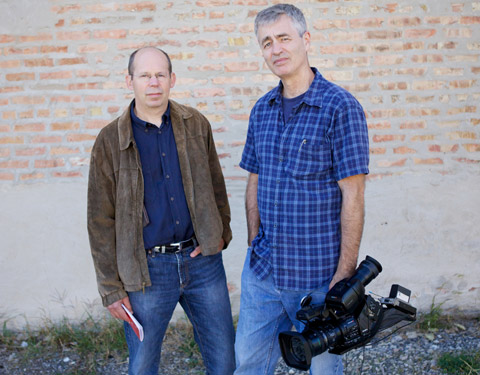
“ . . . Murders are more random, whereas the violence used to be tied more directly to the drug trade. A lot of people in these neighborhoods feel that their kids will get killed walking home from school.” |
It would be wrong to say that Steve James produced the best documentary of all time and didn't look back. Though he's veered onto some unusual paths since chronicling the young lives of two Chicago basketball players in Hoop Dreams (1994) — recently named the #1 documentary to see before you die by Current TV — James has looked back, mostly toward the cyclical oppression whose depiction was at the very heart of that early career masterpiece. I spoke with himregarding his new film, The Interrupters; the street violence intervention in Chicago; the new movie's role as a sort of sequel to Hoop Dreams, and his consideration of a lighter topic for his next project.
>> READ: "Review: The Interrupters" by Chris Faraone <<
WHEN DID YOU START FOLLOWING THE CEASEFIRE INTERRUPTERS IN THEIR WORK WITH CHICAGO YOUTH? WAS THE RECORDED BEATING OF CHICAGO HIGH SCHOOL STUDENT DERRION ALBERT A CATALYST? It wasn't. The inspiration for the project was my producer Alex Kotlowitz, a friend for many years who did an article on CeaseFire for the New York TimesMagazine in 2008. He'd been wanting to get into film, and we started shooting in the spring of 2009. Things started to heat up in the summer, which is where we start the film, and then the Derrion Albert incident happened at the end of the summer around the beginning of the school year.
HOW DOES THE VIOLENCE IN CHICAGO AFFECT THE PERCEPTION OF THE BLACK COMMUNITY IN THE REST OF THE CITY, STATE, AND REGION? Murders are significantly down in big cities since the crack epidemic, but the problem is that 80 percent of the violence in Chicago happens in like 10 percent of the neighborhoods. In those neighborhoods, where we were filming, they don't feel like murders are down at all. If anything, they feel that murders are more random, whereas the violence used to be tied more directly to the drug trade. A lot of people in these neighborhoods feel that their kids will get killed walking home from school.
IS THE INTERRUPTERS A NATURAL EXTENSION OF YOUR PAST PROJECTS? The most personal connection for me comes from Hoop Dreams. Since that film was completed, [Hoop Dreams subject] Arthur's dad Bo — who was a very prominent part of that film, and who I stayed in regular contact with — was murdered in 2004, and William's brother, Curtis, who is also a very prominent part of the movie, was murdered in 2001. Reading about things like that in the newspaper has always bothered me, but watching the impact on these families was shocking and tragic, and really made me want to do this.
DO YOU CONSIDER YOURSELF AN ACTIVIST FILMMAKER? I don't. When I make a film, a lot of it is me trying to understand something that bothers me. In this case, we thought CeaseFire was an effective organization, but Alex and I were also fascinated by trying to go into these neighborhoods and understand what's going on. I had a lot of misconceptions going in; I thought that people were numb and giving up, and none of that was true. People are upset, but they want to change their communities.